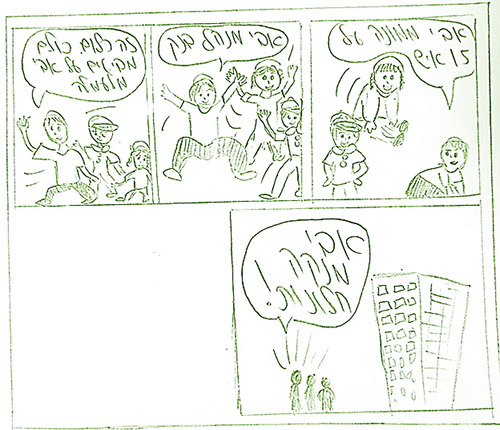
Learn the words in Hebrew to figure out the joke below:
Bank manager—מְנַהֵל בַּנְק
It’s nothing—זֶה כְּלוּם
Look at—מַבִּיטִים
From below—מִלְּמַטָּה
He is cleaning—מְנַקֶּה
Windows—חַלּוֹנוֹת
Everybody—כּוּלָם
The head of—מְמֻנֶּה
Solution:
Jack and his friends were talking about Avi (and how important and successful he is). Jack said: “Avi is the head of 15 people.” Another friend said: “Avi is a bank manager.” The last one said: “It’s nothing.” Everybody looks at Avi from below (everybody is so intimidated), and are afraid to look Avi in the eyes, so they look at him with their eyes averted. Then, they see Avi cleaning a window and they all run and exclaim: Avi is a window cleaner…
Teacher corner: One of my students shared with me that all of the students in his class are scared of one of the teachers. I asked if there was a reason to be scared of her. He said, “Not really, but she is really strict!” I asked, “Do you think that is a good reason to be scared of your teacher? Scary is a big word … ” Students will learn more from a teacher if they treat them with respect. So, it is in your own best self-interest to respect your teacher. He was confused and replied, “I don’t respect my teacher, I am afraid of her!” I suggested, “Try to have a nice and respectful conversation with your teacher, and you will find your teacher very approachable and, maybe, not so frightening.”
We live in a hierarchical society that has been flattened. Equality is a beautiful idea except that it isn’t; when it comes to educating children about our society and the world of their future. Some of my students think they are equal to the adults in their lives, they are demanding all of the rights of being an adult; but have none of the responsibilities. That creates a disconnect between their existence and the reality that adults live in. The greater the disconnect, the more difficult the child’s transition will be to adulthood.
We have all seen children who barge into a store ahead of a senior citizen, don’t think twice about interrupting an adult conversation or leave the dinner table without so much as a, “May I, please?” or a thank you. It has become so commonplace that it is challenging to provide corrective instructions to our children and expect them to heed our discipline. “Spare the rod, spoil the child,” was an early century mantra for parenting. While it has been rejected as old fashioned and out of touch, recent articles identify lifelong benefits for children that are raised to be well-mannered and respectful children. We see the results of respectful behavior in the classroom; children who treat adults and children with respect excel in their academic studies, as well as in social interactions and in their peer relationships.
It is not easy to focus the energy needed to enforce basic manners but it is worth the effort for our children’s future. Basic manners form the foundation of learning to treat people with respect. Treating people with respect is a foundation for developing healthy boundaries. Healthy boundaries are a critical ingredient to establishing and sustaining emotionally healthy relationships.
Creating and setting expectations about what is considered polite and proper behavior is the first step. Require children to knock on the door before entering the room. Ask permission before they leave the dinner table. Do not let a child interrupt an adult conversation or phone-call—children keep interrupting because it works for them—they get the answers and don’t have to wait. Children benefit from having established boundaries, but so do parents! Patience, patience and patience is required in equal measure. Children and teenagers alike will need to be given a few weeks, before they will “master” and remember what is expected.
Given the importance of instilling basic manners in our children, we gain some insight into the prohibition against a child sitting in their parent’s seat. It seems so innocuous to let children sit in your seat at the table; but establishing that boundary sends an important message to the child that, “I can’t sit where I want.” The child learns that there are boundaries, realizes that they are not the most important person in the room and they begin to respect that they are not the final decision makers. This helps to educate children that there is a hierarchy and that their parents are in charge. Having parents in charge makes children feel safe and secure. Being raised in an environment in which children feel safe and secure helps to instill in them a sense of self-confidence and self-esteem.
So, when students are learning to have respect for their parents and teachers, they are acquiring important character traits and life skills. It all starts with a “please” when a child asks for something and a “thank you,” when they receive it; basic manners.
For individual, family or group tutoring in Hebrew, all levels, please email [email protected]. Maya Yehezkel is a Hebrew teacher at Yeshivat Noam middle school.
By Maya Yehezkel










